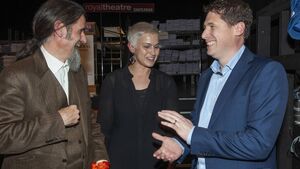European elections tend to provoke confusion or disinterest

Pictured during the count in the TF Royal Theatre in Castlebar for the Midands-North West constituency in 2019 were newly-elected MEPS Luke Ming Flanagan, Maria Walsh and Matt Carthy. Sinn Féin's Carthy resigned his MEP seat within months after he was elected to Dáil Éireann. Picture: Michael Mc Laughlin
European elections have always tended to draw quite a bit of indifference and even confusion among the Irish electorate.
It was superbly captured by a vox-pop carried out by RTÉ’s Jim Fahy in Ballaghaderreen in 2009. One of those he interviewed hit a full house for matters that were not under the remit of the European Parliament.
“The weather – we need weather,” said one man who was asked about his priorities for the European election. “That’s what we need. Farmers need weather and they need to get rid of the Government... Totally annihilate them. They don’t know what they’re doing. All that’s between their ears is sawdust.”
Many might agree with his last point, especially in 2009, but it is telling that he brought matters back to national politics.
In terms of electoral politics, European elections have tended to draw less interest than general elections in Ireland.
The figures back it up. In the 2020 General Election, the turnout was 62.9%. This was the fourth lowest ever in terms of general elections but notably higher than the turnout for the 2019 local and European elections, at just 49.3%.
One can only speculate how low the turnout for European elections would be if they did not run parallel with local elections but it’s reasonable to conclude they would be considerably lower.
When you look at the last term of the European Parliament for the Midlands North West constituency, it is easy to understand why there is disengagement.
Four MEPs were elected but only two of them lasted the term. Sinn Féin’s Matt Carthy was elected to Europe but then ran for and was elected to Dáil Éireann the following year. It meant Chris McManus was co-opted to Europe in his stead.
Fine Gael’s Maireád McGuinness was the first elected in the constituency but when she was appointed as Ireland’s EU Commissioner, her MEP role was vacant and so Colm Markey was co-opted in her stead.
Such a scenario would cause a by-election at Dáil level. I’m not suggesting that should happen in Europe – one can imagine turnout figures would be very low. However, it doesn’t speak volumes for the probity of the election when only half of those elected represented Midlands North West for the full term. That is no slight on Chris McManus or Colm Markey, simply a statement of fact.
And now you have the situation going into this election where Peadar Toibín of Aontú has declared that if he is elected as an MEP for Midlands North West, he will still stand in the next general election. Should he get elected there, he would appoint his sister Eimear, a Meath county councillor, as the MEP.
If he – or any of the other TDs running for Europe – are elected, it could well force an early general election.
The election of any TD to the European Parliament would trigger a by-election. That has to take place within six months of the seat becoming vacant.
It seems highly unlikely the Government would have a by-election in the latter half of 2024 and then a general election a few short months later. So we might be going to the polls by the end of the year in such a scenario.
And were Peadar Toibín to be elected to Dáil Éireann after being elected to Europe, it would mean he was an MEP for only a matter of months. And you wonder why people don’t always take the European elections seriously?
There is also a general disconnect. European matters can often seem quite weighty and hard to follow. People tune into national matters such as health, housing, taxation and employment. There is a sense that European matters do not impact on them to the same extent.
And ownership of the European institutions is hard to feel. Whether everyone likes the Irish Government or not, there is a general acceptance that they are put there by the people.
The electorate may elect MEPs but powerful EU commissioners are appointed by the member states as is the President of the European Commission, Ursula von der Leyen, though that appointed must be franked by the Parliament.
But of course, Europe plays a huge role in our lives. Agriculture is defined by Europe. For all the criticisms of EU imposed climate change targets that the agriculture industry has to hit, Ireland’s agriculture and food sectors would clearly not be as strong today were it not for the EU and the Common Agricultural Policy.
But agriculture sometimes overly dominates European discussions in Ireland and lip service is given to other key issues.
Funding for major infrastructural projects that can define the very prosperity or otherwise of entire regions comes from Europe.
The Trans European Network – Transport (TEN-T) has a Core funding network worth hundreds of billions of euros and represents 90 percent of the EU’s infrastructural budget to 2030. Only projects on the Core network can apply for Core funding. States must financially contribute to the project also.
The ‘Western Arc’ from Cork-Limerick-Galway-Sligo-Derry-Belfast was on that Core network and could draw down huge volumes of funding support from Europe for the likes of the N17, Knock Airport and the Western Rail Corridor. However, in his wisdom, Leo Varadkar, when he was Minister for Transport in 2011, decided to remove the ‘Western Arc’ with one stroke of his pen. It meant the only parts of Ireland now in the Core network are from Belfast to Dublin to Cork and from Portlaoise to Limerick, further accelerating imbalanced regional development.
I recall, on a trip to Strasbourg in 2016, quizzing a sitting Irish MEP on the Western Arc only to be told they had never heard of the Western Arc. It would appear even some politicians are disengaged.
Regional development is keenly monitored from Europe. We’re in the Ireland Northern and Western region – not the same as the Midlands North West constituency, to further add to the confusion.
The Northern Western Region incorporates the five counties of Connacht as well as Donegal, Cavan and Monaghan.
In 2022, the European Commission downgraded us to a ‘lagging region’ when our GDP fell to 71% of the European average. We are ranked 218th out of 234 regions across the EU in terms of infrastructural development. Yet our own Government wrote us out of a multi-billion Euro fund that might attempt to redress that.
Sawdust seems an apt description.





